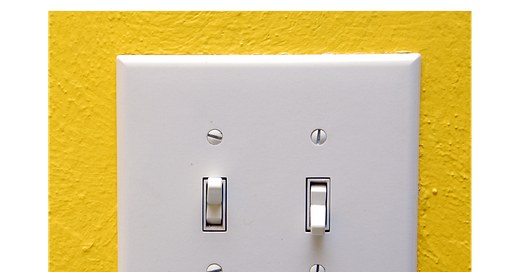I thought about this parent’s comments all day long:
I thought about how I was once the parent trying to survive daily, hour-long meltdowns that completely disrupted day-to-day life.
How I was also desperate to find the magic fix, the intervention that would flip a meltdown off like a light switch.
There had to be some way to stop the meltdown in the moment so we could get a sibling to school on time, or to avoid my newborn being woken up by the screaming, right?
If only it were so simple.
I’ve learned a lot of strategies in the past years as I’ve navigated parenting a highly-reactive child, but a magic meltdown switch isn’t one of them.
If someone were to discover such a thing, they’d be a magician and the most sought-after parenting houdini in the world!
Why? Because brains don’t actually work this way. There’s no instant process to stop the flow of adrenaline and cortisol that the nervous system fires throughout the body during a stress response (fight/flight behavior that presents as a meltdown). The stress response stays active until the hippocampus in the brain binds up enough of the cortisol to shut off the full-body reaction.
An escalated brain has to de-escalate and this process of de-escalation is never instantaneous.
This is a really hard truth to swallow if you’re a parent enduring frequent meltdowns. Accepting that there is no magic switch feels really scary because the meltdowns are so stressful and all you want is to make them stop.
Another reason it’s hard to accept the truth: The magic-switch mindset tends to put the burden for change on the child’s shoulders. It says “I’ll just say the magic word and it will make my child control their behavior.”
On the other hand, the biological-reality mindset puts the burden for change on the parent’s shoulders: it says “my child can’t control their stress responses. I’ve got to make adjustments to better support them. I’ve got to learn to de-escalate during a meltdown.”
That level of accountability is daunting.
However, accepting this reality is what actually brings us closer to real solutions, not magic ones. Solutions that can decrease the frequency and duration of meltdowns!
So what are some of these solutions? Here is a very brief and not-at-all-comprehensive explanation of two things to work on (hear that: work on, not implement perfectly) if your child has explosive meltdowns:
1. In the moment of a meltdown, become a de-escalator rather than a co-escalator.
De-escalators slow down, talk less, back up, pause demands, reduce stimuli, and control themselves.
Co-escalators ramp up, get loud, talk more, make new demands, add pressure, and seek control.
When you behave like a co-escalator, you prolong the stress response because your behavior continues to set off your child’s biological reaction, sending more and more adrenaline and cortisol through their body.
When you de-escalate, you signal safety which allows your child’s stress response to come and go. Meltdowns can pass faster when you de-escalate.
2. Parent outside the moment. Get proactive.
Try to identify patterns of behavior and triggers that overwhelm your child’s tolerance for stress. Learn the early warning signs that precede a meltdown. For example, my highly reactive child tends to get very frantic in her speech and looses her ability to tolerate small frustrations. These patterns clue me into the fact that stress is building inside her.
There is often a critical period when we can de-escalate things before a meltdown erupts if we are willing to slow down, avoid pressure, and keep ourselves curious and collected. When my child’s voice turns frantic, it’s my sign to stop talking and back off for a minute, yes even if I’m trying to get her out the door or into bed.
This pattern shift is a huge ask for a parent faced with a spiraling child, but in the moments when we can get this right, we often prevent the prolonged meltdown from occurring in the first place.
Lastly, see if you can be more proactive about adding supports and scaffolds before your child blows up. As we add in appropriate accommodations, we can set our child up for more regulation. Accommodations are things you adjust or change in the environment or in your expectations to make things more manageable for your child. One of the most important accommodations to make is reducing your constant corrections around small behaviors.
We should never aim to remove all frustration and stress from our child’s life—it’s okay, even imperative, for children to experience discomfort and difficulty. But if your child is experiencing intense, long, and frequent meltdowns, it may be a sign that the level of frustration and stress they’re exposed to is too high. Consider how you can be more flexible and supportive without dropping essential expectations.
To any parent looking for the magic meltdown switch: I understand your exhaustion. You’re showing up everyday for your child and it’s the hardest thing you’ve ever done. I invite you to experiment with some of the solutions I describe here. And I really do mean experiment. You shouldn’t be pushing yourself for perfection or hoping to change everything overnight. Try simply shifting the pattern for one tough moment a day and see what happens.
De-escalation tools changed my home and my relationship with my child and I believe they can do the same for you!








Thanks for the article, this is helpful. My child has enormous explosive tantrums which can be hard to predict and I am sometimes guilty of doing whatever I can to make him stop screaming (ie not holding boundaries) or conversely, finding myself in a power struggle. Please can you talk more about the accommodations we can make eg not correcting small behaviours all the time? What examples could you give for this pls? Thanks so much.
Very Informative email. Love the line "De-escalate, rather than co-escalate" I think I have been co-escalating so far, even though my brain knows that I should stop it. Why don't I have self control? I think I need to do more self-regulation practices. Because, now when my child shouts, I have an urge to shout back, not calm down! I control my impulse to shout twice or thrice, and then end up bursting out in 5 minutes.